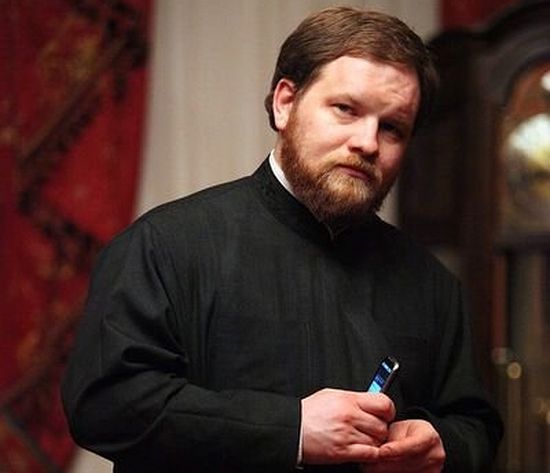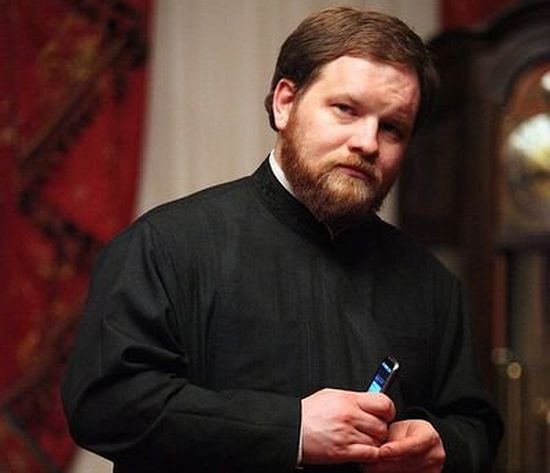
THERE WAS NO INTENTION OF BOYCOTTING THE COUNCIL ON CRETE

РИА Новости – 22/6/16
Press Secretary of Patriarch Kirill of Moscow and All Russia, Fr. Alexander Volkov spoke in an interview with RIA-Novosti about the circumstances surrounding the preparations for the Council of the Orthodox Churches on Crete, and offered his evaluation of the situation that has grown up around the summit of Orthodox representatives.
—Fr. Alexander, you participated in the pre-conciliar meetings this year inChambesy and on Crete. Tell us how they made their decisions, what kind of atmosphere there was at the meetings, and how, in particular, the relationship of the Russian Orthodox Church’s delegation with the representatives of the Patriarchate of Constantinople developed?
—The Russian Church has been quite actively preparing itself for the Pan-Orthodox Council, and had in mind no such intentions to boycott or to create some kind of non-operational atmosphere and paralyze the pre-conciliar work. On the contrary, since the January synaxis (the meeting of the heads of the Local Orthodox Churches—ed.) in Chambesy His Holiness Patriarch Kirill made the decision that our Church will be actively involved in the preparatory work. During the synaxis itself the Russian Orthrodox Church’s responsibilities towards the preparatory work were defined. This pertains, in the first place, to the part of the “documents” and, of course, the protocol-organizational, informational and other work.
Already in the course of the direct preparation we, on the one hand, encountered understanding and willingness to work together, and a completely friendly relationship towards us—no one prevented us from expressing our concerns and wishes. But on the other hand—and this is the saddest—we were given already-prepared decisions on all fronts, including the organizational-protocol, and information fronts.
There were no preliminary negotiations or discussions with the representatives of the Local Churches. We were just told how it would be. We’re going to have these colored badges, this emblem for the Pan-Orthodox Council, here’s the logo, here’s the site … And the site, devoted to the Pan-Orthodox Council, we can say, is an elaborate enough resource, however, when it was presented to the Orthodox Churches they just presented us with the fact that “in two days we are launching this resource.” I don’t mean that all fourteen Local Churches have to decide about the color of the badges. Such questions really can be the responsibility of the technological committee. But no one proposed this scheme of decisions to the Churches.
And, unfortunately, it’s characteristic of the style of the preparation process in general. This is what happened across the board. Undoubtedly, such things have distorted the overall goal, which was that all approved decisions should be prepared and accepted by all Local Churches, not prepared by one Church and then offered to the rest for approval.
Although we must note that from the American Archdiocese of the Patriarchate of Constantinople was gathered a very smart management team of good professionals in this work. And, I repeat, the Russian Orthodox Church was doing organizational work until the last day, and collaborated with them in preparing the Pan-Orthodox Council.
—That is, it could be argued that in the course of the preparations for the Council there was some kind of dictatorship from the representatives of the Patriarchate of Constantinople?
—I don’t know how correct it is to use such harsh wording, but we see that, although every Local Church has its own point of view, the proposed amendments to the common Church documents and key decisions of the upcoming Pan-Orthodox Council are rejected or regarded as unimportant.
The same is happening on the organizational level, where everything has turned out to be predetermined. So, for example, the preliminary budget announced to the Church representatives at the pan-Orthodox preparatory meeting on Crete has caused great consternation. The figures pronounced were unsubstantiated, or in simple Russian, were grabbed from the ceiling, or at least such a feeling arose. Instead of, as was suggested in Chambesy, forming a separate budget committee to discuss the financial side of things, it was just announced that the Council’s estimated budget ran several millions of dollars. Further, this amount was equally divided among all the Local Orthodox Churches. Although it’s obvious that the same amount is in general not small for any Orthodox Church, it could be more or less feasible for a large local Church and practically unmanageable for another.
Overall, the organization of this preliminary work caused an extremely negative reaction, and this atmosphere dominated the second meeting of the Pan-Orthodox Secretariat for preparing the Holy and Great Council, which, I think, to some extent played a role and undoubtedly influenced subsequent developments.
—Will there be some letter or clarification prepared for the flock of the Russian Orthodox Church in connection with the recent events surrounding the Pan-Orthodox Council?
—I think our flock met the recent decision of the Holy Synod with understanding. The decision and the separate letter of the Synod, I think, were more than enough for the flock of the Russian Orthodox Church. The question of the need for any further special statement or address to the believers is not on the agenda.
—During Patriarch Kirill’s recent trip to Athos for the celebration there of the 1000th anniversary of the Russian presence, was the topic of the upcoming Pan-Orthodox Council raised during his meeting with the Athonite monks, or with the Athos hierarchy?
—In the most general of terms.
—Are there any bilateral contacts with representatives of the other Local Churches about the Council now starting? If so, who with?
— The Department of External Church Relations of the Moscow Patriarchate is in constant dialogue with all the Local Orthodox Churches, and, of course, such dialogue is now very active. It’s clear it can’t have any degree of publicity.
—Is this the first such scandal in the history of world Orthodoxy?
—I think it’s not worth it to dramatize the situation. It is, of course, unpleasant and demands a solution and clarification. We hope on the understanding of responsibility from all sides in world Orthodoxy. But generally, in different historical periods there developed the most diverse, and at times most complex relations between the Local Churches.
Relations between the Churches can lead to quite unpleasant consequences, for example, to a break in liturgical, eucharistic communion, as there currently is between the Antiochian and Jerusalem Churches. It’s really a problem. From the Church’s point of view the problem of a break in liturgical communion is much more substantial than calling the Council—it’s a tragedy which has deep consequences. But this is all surmountable; in the history of the Orthodox Church there have been much more dramatic events.
